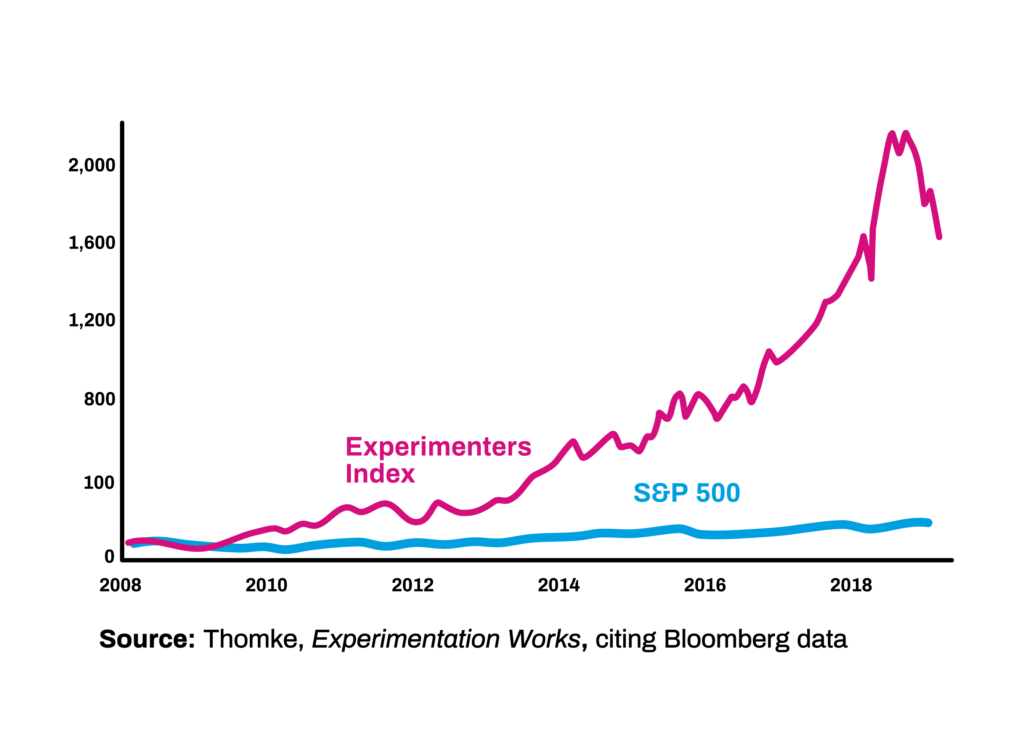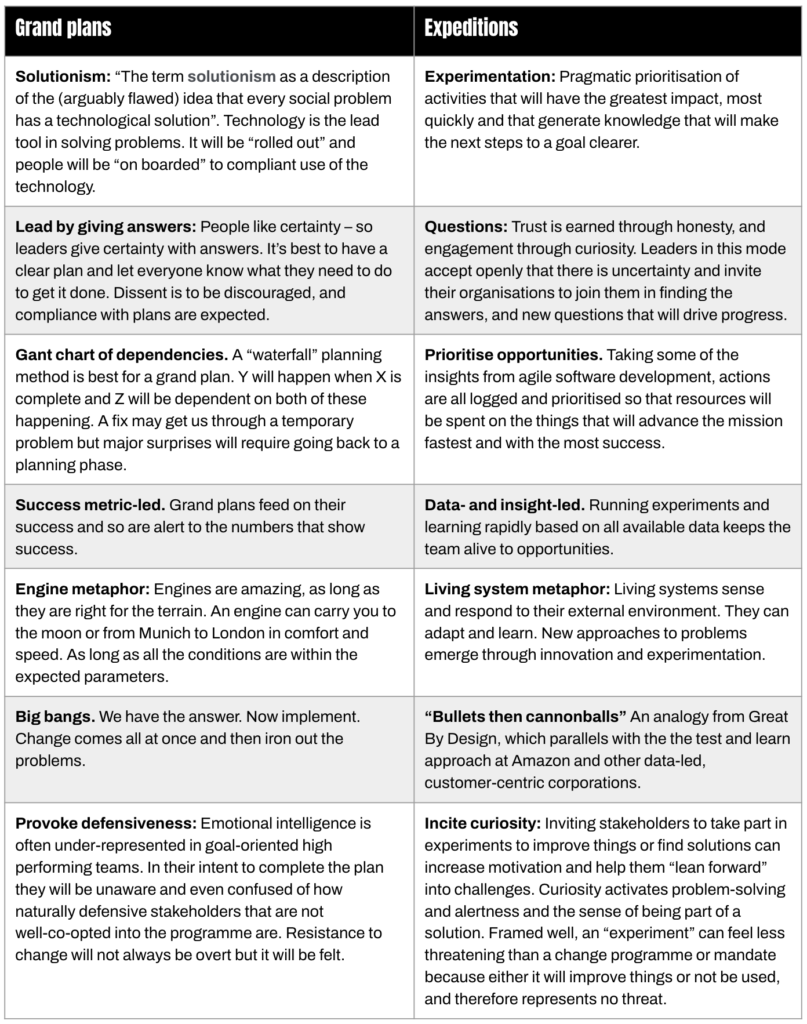The most valuable brands today belong to companies that are experimenters by design and by habit. Businesses that want to compete need to learn lessons from Amazon, Netflix, and Airbnb, and apply those learnings to their own organisations. Marketing is the best place to start experimenting. Why? It’s a natural context for running test-and-learn programmes and scaling rapidly from success.
Stock performance of leading experimenters (January 2, 2008= 100*)
An equally weighted index consisting of Amazon, ETSY, Facebook, Google, Microsoft,
Netflix, and Booking Holdings. These companies have spent years building infrastruc-
tures and cultures for large-scale experimentation.

For years, brands have used experiments to great effect in performance marketing, but very few have extended the approach beyond A/B testing for ads and e-commerce (let alone at the interface of other business functions and disciplines). As a result, marketing organisations are siloed around markets, product lines, and customer types. This is no fault of marketers. The issue is structural – a reflection of the wider organisation and a result of how businesses have adapted to challenges of scaling over the past 100 years.
However, the kinds of organisation design and business culture that succeed (and how marketing functions as part of those things) have seen some profound changes over the past two decades.
A vast majority of CMOs know they have to make large-scale changes to marketing. 71% agree that, to achieve the long-term vision, the role of marketing has to be re-evaluated. To fulfil that vision, CMOs must lean into their role as change agents, reimagining and reappraising the components required to drive the marketing machine. And yet, any attempt to change is often led by an incumbent, supposedly controlled approach.
“Grand Plans” vs Experiment-Led Expeditions
“Change programmes rarely succeed, and the costs of attempting them are often tremendous.”
Antony Mayfield, CEO Brilliant Noise
When challenged by the waves of digital disruption that have transformed media, customers, markets, and our whole culture, the response has been to try to make definitive shifts through change management or digital transformation initiatives. Sometimes the emphasis has been on technology, sometimes on a new media channel, and sometimes on data or capabilities. But when the change project ends, the outcome is usually the same: a sense that the change hasn’t gone far enough, or that the digital world has outrun any progress made.

Whether it’s because short-term priorities take over, because silos and bureaucracy get in the way, or because transformation isn’t scaled effectively, sweeping change programmes rarely succeed. The direct expense associated with the programme can place an immense financial burden on organisations, while the indirect costs of not succeeding take the form of missed opportunities for what could have been achieved.
At the heart, Test–Learn–Lead™ is a process of constant experimentation and adjustment, allowing organisations to identify opportunities, utilise them before their competitors, and react to changing customer preferences.
Lead with experiments for fast, certain and motivating change
Every journey starts with a first step. One problem with the “Grand Plan” approach is that the first step needs to be agreed months in advance by multiple stakeholders all obsessed with how and where the planting of that step will affect their agenda. The advantage of leading with experiments is that the process can begin quickly and gather supporters along the way – supporters who’ve been persuaded by results from early experiments and the social proof of others joining the effort.
Brilliant Noise’s Test–Learn–Lead™ programme provides an alternative approach to marketing innovation and transformation, offering rapid gains by allowing ideas to be tested and scaled before any long-term, radical change is implemented.
The key is to set a direction and then run experiments to find out what works. (Like Amazon and other companies that have found ways to thrive in an uncertain environment.)
Brilliant Noise’s Test–Learn–Lead™ process for experiment-led marketing change
At its heart, Test–Learn–Lead™ is a process of constant improvement, allowing organisations to identify opportunities, utilise them, and react to changing customer preferences before their competitors.
The programme enables organisations to design and execute experiments quickly, taking small, incremental steps rather than large and costly ones. This gives teams the power to quickly assess and measure impact to scale and deepen successful interventions while phasing out those that did not deliver.
In challenging times, ambitious “Grand Plan” programmes are slow, unreliable, and difficult to win support for – much better to focus on small programmes, with rigorous, standardised prioritisation, measurement, and knowledge management processes in place. When you find what works, the success will speak for itself as evidence, making it far easier to secure further investment.
Test-Learn-Lead™ is designed to ensure organisations can make the most of the available data to identify, optimise and scale successful results (fast), making sure the time and resources dedicated to innovation and change aren’t wasted.
As the new year roles in, marketing organisations should be feeling the imperative for change. Let’s design a programme guaranteed to energise teams and make marketing transformation stick, once and for all. Get in touch to find out how experimentation can set your brand up for success in 2023 and beyond.
